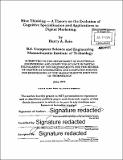Hive thinking : a theory on the evolution of cognitive specialization and applications to digital marketing
Author(s)
Rein, Harry A
DownloadFull printable version (6.425Mb)
Alternative title
Theory on the evolution of cognitive specialization and applications to digital marketing
Other Contributors
Massachusetts Institute of Technology. Department of Electrical Engineering and Computer Science.
Advisor
Glen Urban.
Terms of use
Metadata
Show full item recordAbstract
The purpose of this work is to put forward a theory of the evolution of cognitive specialization and demonstrate its significance towards the future development of human and computer interaction by demonstrating it in a modern context. For millennia, great minds have wrestled to build a typing model to classify the differences in human behavior. Recent theories have driven towards a theory of four functional abilities of the mind coming in two attitudes that drive asymmetrical development resulting in cognitive types, or personalities. Modern digital systems currently have rudimentary models of human cognition, it is this document's belief that by encoding a typing model our systems will begin to understand and act in a manner more similar to human behavior. The theoretical, more human extension of this work is to observe the evolution of a single 'hive consciousness' - a collection of individual minds acting as a single sustaining entity - with the underlying belief that it is the development of an optimal hive structure, not the development of an optimal individual mind, that results in the emergent seemingly specialized cognitive styles. The grounded, implementation based extension of this work is to demonstrate in a simple web-based digital marketing implementation - a system that can drive user actions, monitor those actions as to create an understanding of that particular user's cognitive type, and finally adapt it's contents as to optimally convince the user to consider a purchase decision.
Description
Thesis: M. Eng., Massachusetts Institute of Technology, Department of Electrical Engineering and Computer Science, 2016. Cataloged from PDF version of thesis.
Date issued
2016Department
Massachusetts Institute of Technology. Department of Electrical Engineering and Computer SciencePublisher
Massachusetts Institute of Technology
Keywords
Electrical Engineering and Computer Science.